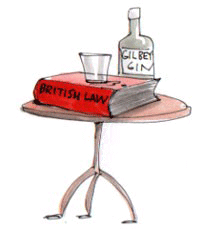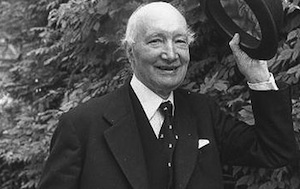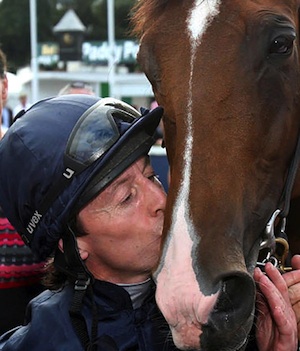The heir to Denning
 Leverhulme •
Leverhulme •  Monday, July 4, 2011
Monday, July 4, 2011 "It was bluebell time in Kent." ... Only a few judges likely to score over 50 in the Flesch test ... Jackson LJ pens a masterly judgment in Epsom Derby case ... Leverhulme's London Calling
 I have no wish to insult my readers, but can you pass the Felsch test? At least that's what Lord Hope of Craighead appeared to call it.
I have no wish to insult my readers, but can you pass the Felsch test? At least that's what Lord Hope of Craighead appeared to call it.
In truth, it's the Flesch test.
Many lawyers fall short. Managers and human resource people flunk regularly.
How many times have you received an email which comprises a long unbroken paragraph of expressions such as "framework parameters," or "resource deliverables?"
How often have you tackled a judgment feeling like you were breaking into the Bank of England?
Well the Flesch test might be the answer.
It is a simple calculation: 206.835 - [((1.0150w + (84.6) s] where w equals the number of words in a sentence and s equals the number of syllables in a word.
A score over 50 is considered satisfactory.
 Denning: teetotallerLord Denning, probably because he was a teetotaller, was a champion Flescher.
Denning: teetotallerLord Denning, probably because he was a teetotaller, was a champion Flescher.
He scored 85.99 for the opening paragraphs of White v Blackmore and 76.30 for these little-known sentences.
"It happened on the 19th April 1964. It was bluebell time in Kent. Mr and Mrs Hinz, the plaintiff, had been married some ten years, and they had four children, all aged nine and under. The youngest was one. In addition to her own four, she was foster mother to four other children. To add to it she was two months pregnant with her fifth child.
On this day they drove out in a Bedford Dormobile van from Tonbridge to Canvey Island. They took all eight children with them.
As they were coming back they turned into a lay-by near Thurnham to have a picnic tea. Mr Hinz was at the back of the Dormobile making the tea. The plaintiff had taken Stephanie, her third child, aged three, across the road to pick bluebells on the opposite side.
There came along a Jaguar car out of control driven by Mr Berry, the defendant. A tyre had burst. The Jaguar rushed into this lay-by and crashed into Mr Hinz and the children. Mr Hinz was frightfully injured and died a lttle later. Nearly all the children were hurt. Blood was streaming from their heads.
The plaintiff, hearing the crash, turned around and saw this disaster."
Some barristers sneer at this judgment and say it is unbecoming of a judge.
Bullshit.
It has the following qualities. There is a story told in simple language (rushed, crashed, disaster) which one is drawn to keep reading; it paints a vivid picture of a family picnic and crucially it neatly states all the essential facts for a successful action in nervous shock.
Lord Denning, who had a triple first class Honours degree from Oxford, had another skill: he could deftly state the main point in a case right at the start.
In Barclay's Bank v Inland Revenue, Lord Simonds opened the bowling thus: "This appeal once more demands your Lordship's consideration of section 55 and 58 of the Finance Act 1940."
Lord Denning said this:
"My Lords, Tom Shipside died on December 15 1955. The question is whether, during the last five years before his death, he 'had the control of' a company called T. Shipside Ltd: for the amount of estate duty depends on it."
 Lord Justice Jackson: passed the Felsch test with flying coloursTom Denning died 11 years ago. At last he has an heir. His name is Sir Rupert Jackson. He is renowned among other members of the judiciary for his speed and accuracy and he has just conducted a highly regarded review of the Civil Procedure Rules.
Lord Justice Jackson: passed the Felsch test with flying coloursTom Denning died 11 years ago. At last he has an heir. His name is Sir Rupert Jackson. He is renowned among other members of the judiciary for his speed and accuracy and he has just conducted a highly regarded review of the Civil Procedure Rules.
His writing is superb.
Some weeks ago, on the eve of the Derby, Lord Justice Jackson and Lord Justice Elias sat from 4pm to 6.30pm to hear the appeal of a wealthy Turkish racehorse owner.
The judge at first instance, Mr Justice MacDuff, had that morning refused an application for an interim injunction.
It was an extraordinary case. Kieren Fallon, a jockey known to Justinian's readers, signed an agreement with the owner to ride a horse called Native Khan in the Derby.
Then he jumped ship and was booked to ride a horse called Recital for his old employers, Ballydoyle.
The Turk, Mr Vefa Araci was cross. He said if Fallon would not ride his horse, then he could not ride Recital. The Court of Appeal agreed.
The 11 pages written by Jackson LJ delivered at 9am the following morning, are a model of judicial writing.
I showed it to a friend who is an artist. He said it was easy to understand and very interesting.
Perhaps it should be used as a teaching tool at the Judicial College.
It is separated into six parts with pithy headings and numbered paragraphs. Even the dullest law student will be able to distil the ratio in years to come.
 Fallon: disregarded contract with Vefa AraciThough it must have taken most of the night to write and settle, the style is succinct and the coverage thorough. Sir Rupert's analysis of the case is masterly and appears early.
Fallon: disregarded contract with Vefa AraciThough it must have taken most of the night to write and settle, the style is succinct and the coverage thorough. Sir Rupert's analysis of the case is masterly and appears early.
"The issue in this appeal is whether Mr Kieren Fallon, the well-known jockey, should ride in the Epsom Derby today."
There are some Denning touches:
"The favourite in the Derby today is a horse called Carlton House, owned by Her Majesty, The Queen. The next four favourites in the betting include horses called Recital and Native Khan."
The dignity of the original judge is preserved courteously:
"At this point I should pay tribute to the judge for the excellent manner in which he dealt with a series of issues that were highly contentious at first instance, but are no longer live before this court."
There is the odd crushing observation:
"The defendant has brought this present predicament upon himself by his own deliberate and cynical disregard of a contract recently entered into."
Finally, and most importantly, the case sets a precedent in situations where an award of damages in lieu of an injunction would not be an adequate remedy.
Elias LJ produced a clear concurring judgment.
If only other judges wrote like Sir Rupert.
By the way, Native Khan came in fifth and two lengths away in sixth place was Recital. The Queen's horse came third.
* * *
I learned of the Flesch test when I read an excellent paper by Lord Hope of Craighead who until this week was one of two Scottish judges on the Supreme Court.
His subject was writing judgments.
It should be another recommended text for the Judge's Nursery.
Footnote 31 contains Lord Hope's unfortunate spelling of Rudolph Flesch's name. The transposition of two letters makes a world of difference.
 Earlsferry: clear thinking ScotThere is a smart quote from the legendary Lord Reid.
Earlsferry: clear thinking ScotThere is a smart quote from the legendary Lord Reid.
"Technicalities and jargon are all very well among ourselves - a system of shorthand - but in the end if you cannot explain your result in simple English there is probably something wrong with it."
There are also some respectful references to Lord Hope's Caledonian colleague Lord Rodger of Earlsferry who died prematurely last week after suffering from a brain tumour.
Lord Rodger himself was a champion of clear writing and delivered a paper in 2002 entitled The Form and Language of Judicial Opinions.
On a cautionary note, the last time I praised a judgement in these pages, it was thumped by the House of Lords.









Reader Comments